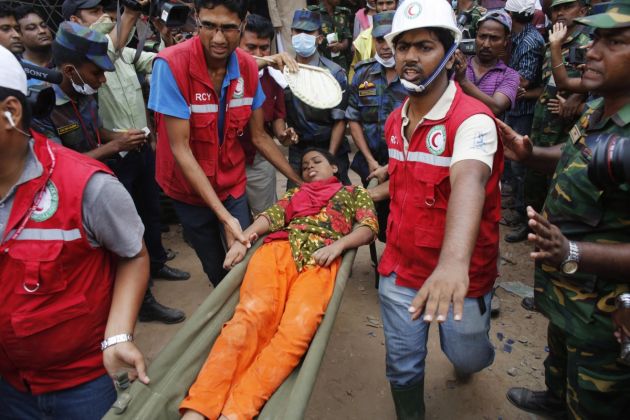Bangladesh factory collapse highlights fatal pattern

Searchers were still searching through the rubble for victims Friday following the collapse of an eight-story garment factory collapsed in the Bangladeshi capital of Dhaka.
The known death toll rose to 291 Friday and the number could creep higher, police said.
Garment workers protested on the the streets of the Bangladesh capital Friday to protest the collapse of the factory building that collapsed Wednesday morning as workers began their shifts making garments, many for Western retailers. Police and protestors clashed.
The building collapse is one of a string of Bangladeshi factories' lethal accidents.
Rev. Martin Junge, general secretary of the 70-million strong Lutheran World Federation in Geneva criticized safety regulations at the factory saying human beings should not be sacrificed for profit.
"We realize that once more many lives were lost because of disregard for safety and security regulations," Junge said in an April 25 letter to Bishop Arobindu Bormon of The Bangladesh Lutheran Church and Rev. Paulus Hasdak of The Bangladesh Northern Evangelical Lutheran Church.
In November, 112 workers died when a garment factory caught on fire, despite the fact that factory owners had received two warnings from local fire officials and were not given a renewed safety license.
Three years ago, a four-story garment collapsed, killing 25 workers, and in 2005, 64 workers were killed when a sweater factory collapsed.
PRESSURE TO PRODOUCE CHEAP GARMENTS
But the pressure to produce lots of garments, and to do it cheaply, is high.
In recent years, the Bangladeshi economy has done a 180 degree turn.
Its tourism industry is increasing, and agricultural innovations have kept the 70 percent of Bangladeshis who work as subsistence farmers afloat.
But the garment industry is still considered jewel in the crown by the business elite.
Bangladesh is one of the largest garment exporters in the world, second, only to China, and a full 80 percent of Bangladesh's export revenue comes from the garment industry.
The vast majority of the garment money pouring into Bangladesh comes from the United States and the European Union, both of which increasingly are looking to Bangladesh as China's labor costs, and thus prices, rise.
So monitoring groups say corners are cut, and laws are dodged, to keep production up and costs down.
For example, at the sweater factory that collapsed in 2005, operators of the factory had illegally constructed additional stories in the building to create more workspaces.
But if American consumerism is part of what is fueling the problem, some U.S. churches are also trying to curtail it.
The Presbyterian Church U.S.A. has a labor initiative and a downloadable guide with consumer tips and retailer score card can be found on their website.
Leslie Morgan, part of a husband-and-wife Presbyterian missionary team, has spent the last 23 years serving in Bangladesh.
DHAKA EVENTS IMPORTANT TO ALL CHRISTIANS
He said what happens in Dhaka and around the world should be important to all Christians.
"The global church must continue to speak out against the evils of unbridled capitalism," he said, "and, at the same time, stand beside the churches in Bangladesh as they minister to the poor and powerless."
The United Church of Christ has also vocally opposed poor labor conditions overseas for decades. It has gone so far as to ensure that any official item sporting the UCC logo is either eco-friendly or on sweat-free.
"One of our fundamental values is that we love our neighbor," said Edith Rassell, UCC minister dealing with economic justice. "So these folks in Bangladesh that were just killed are our neighbors in the global sense.
"We have blood on our hands because we participate in this immoral system of production; Walmart wouldn't be contracting with these factories in Bangladesh if we didn't buy the clothes when they hit the shelves."
Rassell said making ethical consumption choices are important, but those choices alone are not enough to effect real change.
She noted that unless their coffee and fruit are fair-trade, and their clothes union-made, many Americans have participated in the potentially fatal exploitation of low-wage workers before they even leave the house in the morning.
"How do we live as people in North America? We've got to change the laws, the regulations and the structures to they allow us to live without exploiting people," she said.
Rassell said the only solution is independent and neutral inspectors who can enforce regulations in garment factories.
Also, Americans will have to change what they expect from retailers.
"Ultimately, we will have to pay a little bit more, and companies will have to pay a bit more so [factory owners] can actually follow building codes," she said.